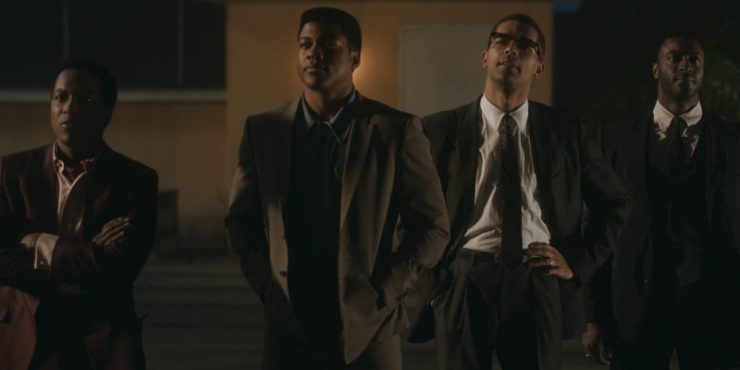In a way, One Night in Miami is its own kind of superhero movie. Its structure and tone are rooted in populist storytelling, history through the eyes of American titans. That it takes real historical figures and places them in a fictional story only adds to the mythos. In her feature debut, director Regina King proves that mainstream action films don’t need high-concept fight sequences or uncanny special effects. Written by Kemp Powers (and based on his play), Miami builds intensity through its character’s ideas and opinions. Four remarkable men – Malcolm X, Cassius Clay, Jim Brown and Sam Cooke – spend a night in a hotel room, debating the significance of their mark on American culture. Their friendship is iconic but their disharmony creates real drama that King brings to the screen with electrifying precision.
King, better known as a veteran actress of film and television (and recent Oscar winner for If Beale Street Could Talk), gives Powers’ screenplay the room it needs to expand beyond a one-act chamber drama while still maintaining the intimacy of its setting. The one night referenced in the title is February 25th, 1964. Three months after the Kennedy assassination, it’s the night of the championship bout between Sonny Liston and Cassius Clay (Eli Goree). Afterward, Clay plans to meet with his two superstar friends, singer/songwriter Sam Cooke (Leslie Odom Jr.) and NFL phenom Jim Brown (Aldis Hodge), at the hotel room of Malcolm X (Kingsley Ben-Adir). For Brown and Cooke, this is the modest prelude to a night of celebratory fraternizing, but Clay actually wants to take the opportunity to announce his intentions of joining Malcolm X in the Nation of Islam and become Muhammad Ali.
Tensions begin early when a night that was meant to be rakish fun turns out to be a chaste conversation in a small hotel room. Their discussions swirl around the expectations and responsibilities of being a Black man and a public figure. How much do you owe to the Black community? How much are you willing to give to the white community in exchange for success? One Night in Miami never acts as though these questions – amongst many others – have easy answers. These four men, each dominant figures in their field, all differ in their forms of dogma, complimenting and aggravating each other’s arguments at the same time. The biggest gap is between Cooke and Malcolm. Cooke cannot understand Malcolm’s insistence on alienating the white community and the resources they can provide. Malcolm is aghast that Cooke would write pacifying, commercially successful songs that placate white audiences, while the Black struggle continues.
The film opens with about fifteen minutes of somewhat necessary stage-setting, introducing all four in their unique environments, displaying both their celebrity status while still acknowledging their hostility with white authority. It’s when the film reaches the hotel room that One Night in Miami becomes truly special, as they attempt to deconstruct what it means to be successful in their positions. There are some caveats. Malcolm is looking to leave the Nation of Islam (he has been silenced after saying the Kennedy assassination was the white man’s “chickens coming home to roost”) and start his own Muslim organization. He is hoping to use Clay as the jumping-off point. Brown is considering giving up his record-breaking football career to pursue Hollywood movie acting. Even Cooke, so reluctant to Malcolm’s rhetoric, dreams of being an artist of substance who can write songs that speak to the turbulence of the moment.
These secrets and ulterior motives all bubble up over the course of their night-long talk which oscillates between friendly and ferocious, unmasking insecurities and building stronger bonds. King and Powers (who was also a writer and co-director on Pixar’s Soul) are telling a fictional story but their reliance on history helps them here. There is no rush to solve all these issues, because as we know, the issue still exists. The tensions between Cooke and Malcolm comes mostly from the things that they agree on, not vice-versa. In their performances, Odom Jr., Hodge, Goree and Ben-Adir rely less on the mimicry that defines most historical biopics. Odom Jr. gets to flex his famously electric voice and Goree gets to espouse Ali-isms like “I’m so pretty!”. Otherwise, the four actors mostly serve Powers’s script instead of their own talent for recreation.
All four actors are commendable, and King is careful to make sure they all get their fair due in a way that is organic to the story. This is not exactly an easy thing to do, balancing the tones and rhythms of their characters into what is mostly a single setting, but she pulls it off. One Night in Miami is populist prestige cinema – a film made for awards season – in the best possible definition of the phrase. It speaks honestly about racial struggle without shrouding it in white savior-ism like so many other “commendable” Hollywood films about race. Of course, it makes a big difference that Miami is directed by a Black woman, and not a white man like in the cases of films like Green Book or Driving Miss Daisy. Freeing itself from whiteness (with the exception of a notable cameo from Beau Bridges), makes One Night in Miami stand out among American studio films about race, but it also helps make it an exceptional film in its own right.
Directed by Regina King










